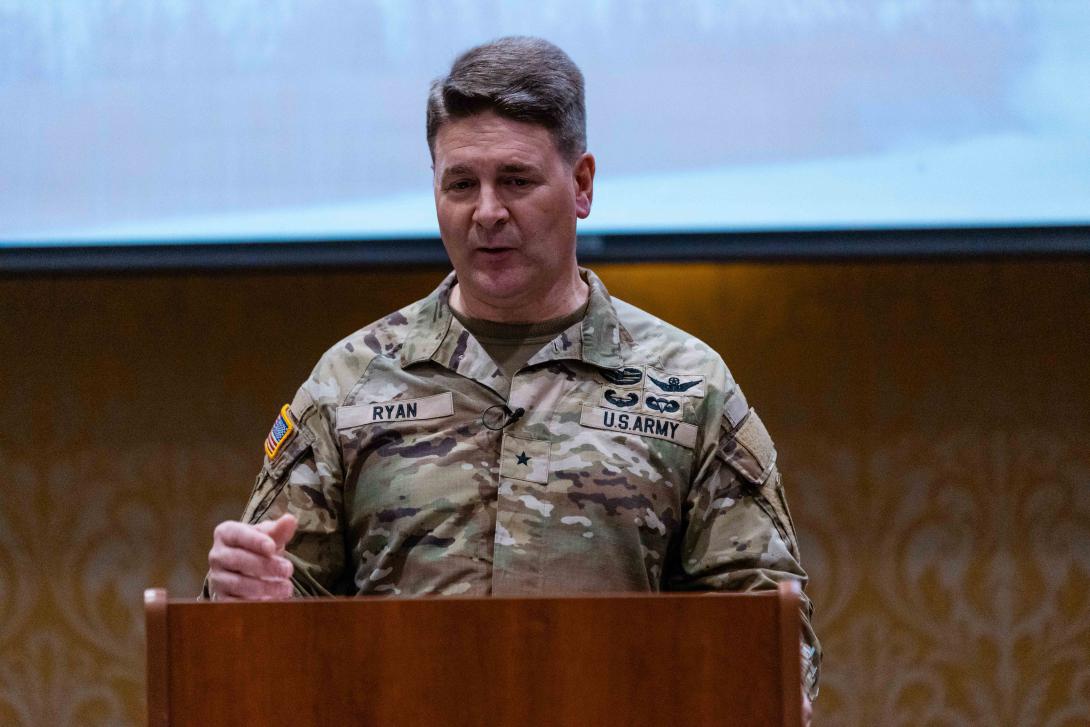The U.S. Military Can’t Afford To Leave Success to Chance
The U.S. military must be intentional about success, explained Brig. Gen. Philip Ryan, USA, during his closing keynote address on Friday, February 10, at TechNet Fort Bragg Symposium and Exposition.
Gen. Ryan, who was recently appointed as deputy commanding general-Futures for the United States Special Operations Command, noted his three focus areas: unmanned aerial systems, radios and unification of air-launched effects. “I don’t like small problems.”
September 2001 introduced the United States to a new and unconventional adversary. “Nearly 20 years ago,” Gen. Ryan began, “there was no fully reliable mechanism in place by which U.S. forces could communicate effectively across not only the vast regions of the mountainous, unforgiving country of Afghanistan but across the immense technological desert where [communication] infrastructure resistance did not exist to our forces to the target.” The target Ryan referred to was the leader of the Taliban.
Speed, range and convergence equate to faster and farther combined systems and effects, the general said.
“The speed of our equipment in order to match our adversary or the ability to quickly collect and analyze data will shorten the decision cycle or kill chain,” he explained, further adding that the focus must be on better leveraging artificial intelligence, machine learning and quantum computing.
The ability to operate in a contested communication environment is key. Only through “secure long-range communication technologies, next-generation tactical radios, integrating the latest security methods and low probability of intercept detection and anti-jam waveforms,” can such capabilities be achieved.
In the case of convergence, the answer comes down to breaching policy and culture barriers.
“I don’t have to tell you all that our potential adversaries are actively developing tools to the greater ability to command and control and effectively operate at the tactical edge,” Gen. Ryan clearly stated. The U.S. military must remain superior while being challenged by attacks on networks.
The topic of enormous amounts of data is one shared among nearly all military and industry leaders. For Gen. Ryan, the problem lies in linking sensors to shooters to sustainers of relative data. “What information needs to be shared? Where and when? That’s a big question.”
The issue around policy continues to create frustration among military peers. “Current security policies and regulations prevent partner nations access to raw data ingested from causal networks … we can’t really call them partners if we cannot share information,” Gen. Ryan said.
The general circled back to his opening story on Operation Enduring Freedom , the war on terrorism. “A lack of unified communication capabilities and the loss of a SATCOM [satellite communications] radio wave between the operational command and the helicopters in the ground forces took the air mission commander on a night in October 2001 out of a fight for the entire operation,” he described. “The eventual success of this mission rested with a young captain located on a refuel site in another country, serving as a retransmitter.”
He continued by emphasizing the need for intentionality. “We were fortunate to have such an effective young leader in the right place, at the right time. But we can’t always rely on favorable timing and circumstances,” he said.
“We can’t afford to leave success to chance.”





Comments